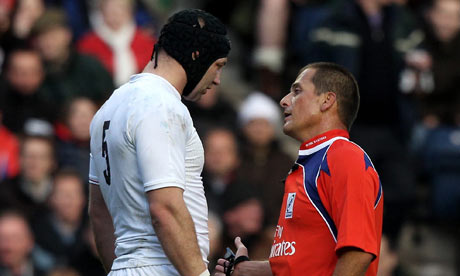
1 Scrum shambles
It took nearly three minutes at the end of the first half for the ball to be delivered from a scrum. The South African referee, Marius Jonker, ordered three resets and lectured the two front rows but his indecision was final and the set piece disfigured the match. The packs went down 23 times and the ball emerged only seven times. Eight minutes were wasted on resets, slowing down what was never a quick game. The surface was soft but so was Jonker – those who collapse mauls are sent to the sin-bin but not those who bring down scrums.
2 Foden for thought
Most of the vital statistics were Scotland's. They enjoyed more possession than England; made more passes (169 to 108); offloaded twice as often; won the vast majority of turnovers; and made 20 visits to England's 22 compared with 12 in return. Their forwards passed the ball twice as often as England's and made far more ground but there were only four players who carried the ball to any great effect: Sean Lamont, Max Evans and John Beattie all approached 70 metres. The only England player near to that figure was Ben Foden, who was on the field for only the final 28 minutes. He covered 63 metres compared with 25 from the man he replaced at full-back, Delon Armitage, and was willing to run from deep rather than kick possession back. The Northampton man gave his side impetus which nearly proved decisive.
3 Slow, slow, quick-slow-slow
It was the third successive Calcutta Cup match at Murrayfield that failed to produce a try but unlike the previous two there was not an excess of kicking. It was a case of another England game breaking down at the tackle. England conceded four penalties at the breakdown in the first 18 minutes, three times while defending, but despite Jonker issuing Steve Borthwick, as captain, with three warnings, he never reached for his yellow card. Scotland were no less averse to slowing down opposition ball and gave away six breakdown penalties to England's seven. While both sides had a willingness to move the ball they were also prepared to concede three points rather than risk seven – curiously so, given that each line was threatened only once.
4 Dan was the man
Scotland may have completed a fifth match in six without scoring a try but Andy Robinson has transformed the way his side plays, confounding the saying that you cannot teach an old dog new tricks. The fly-half Dan Parks, left, who won a 50th cap, was booed by the Scotland crowd less than two years ago: they did not appreciate his safety-first approach. On Saturday, while he made one poor drop-goal attempt and once chipped over the line when he would have been better off keeping the ball in hand, kicking was not his first option: he made 40 passes and kicked out of hand 12 times, varying his options and bringing runners into play. He did not play by numbers, even running from his own 22 in the 11th minute, and he kept his head up. He is playing flatter than he used to and giving himself more options than England's Jonny Wilkinson.

